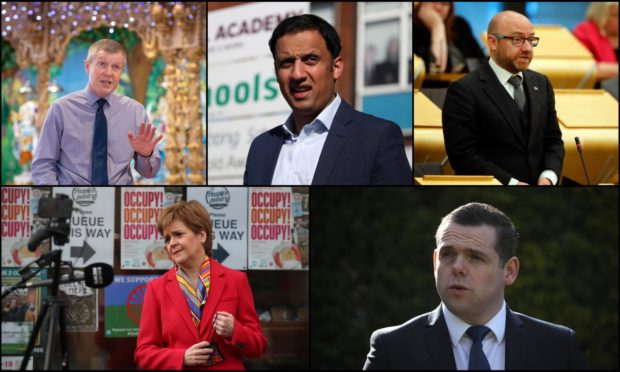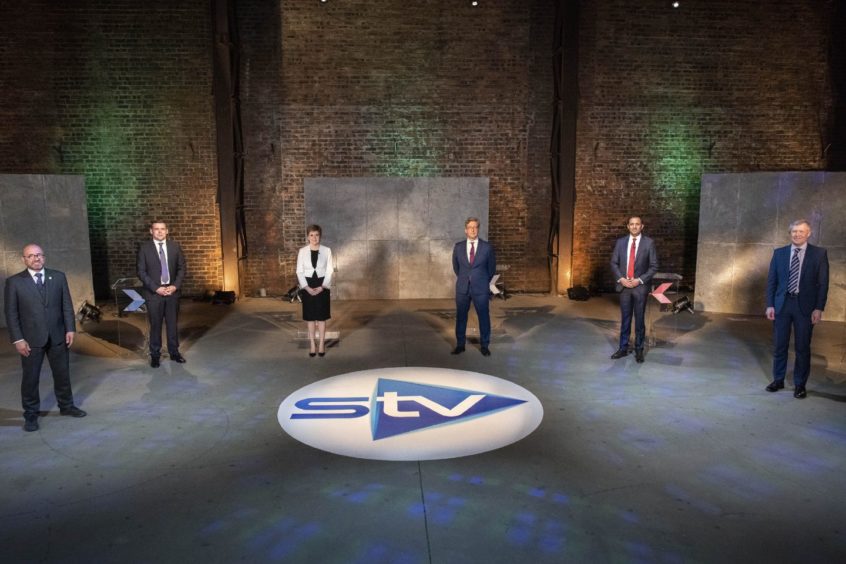There’s a saying about déjà vu – somewhere, at some time, you’ve been repeatedly hit on the head like this before.
If that’s the case, then Tuesday night’s debate on STV certainly felt like déjà vu.
Independence, no referendum, Scotland’s choice, old wounds, lack of powers, use the powers we already have — if you were taking notes on Scotland’s most-used political phrases of the last decade, you would have had a full-house 12 minutes into the 90 minute programme.
Host Colin Mackay did a tremendous job keeping answers concise and on target, a firm but fair hand which those in charge of Holyrood’s debates and committees could learn from.
He even had a clever joke at the end, commenting on those taking to social media to say their preferred leader had won, regardless of what they said.
Question Time
Part of the debate saw the five leaders of Scotland’s main parties grill each other, under the keen eyes-of-Mackay.
It allowed leaders the chance to put themselves in the first minister’s shoes, defend their own manifesto promises as if they had enacted them and repeat important party lines (and in some cases, their names).
Ms Strurgeon, on speaking to Scottish Green co-leader Patrick Harvie, gave her not-coalition-but-kind-of-coalition-partner an underarm bowl.
This, firstly, allowed Mr Harvie the chance to align his views on a second referendum on independence with the SNP’s, toeing the party line as “a choice for the people of Scotland” to make.
But secondly, and more intriguingly, it allowed Ms Sturgeon the opportunity to show she already had a serious partner on independence, and is in no way reliant on any new parties lead by former bosses not invited to Tuesday’s get-together in order to get her way.
Eye off the ball
Astonishingly, Ms Sturgeon admitted that her government had “taken its eye off the ball” in regard to the country’s damning drugs death statistics.
Acceptable language, maybe, if you’re a League Two midfielder who has fluffed a shot from outside the box
But for the first minister of a country disgraced by the worst substance abuse fatality rates in the Western world to say so, is another thing altogether.
There are 72 families in Dundee alone this year you can be sure would never regard it as nonchalantly. Sixty-six from the year before. Sadly, that number is set to go up again this year, covid pandemic or not.
Not that Douglas Ross or the other party leaders seemed overly concerned.
The issue was raised only once, and although Mr Ross asked the question, he moved on as quickly as the first minister had dubbed it one-of-those things.
She said she had appointed a minister responsible for tackling the crisis. Ms Sturgeon, of course, already had one in Dundee West SNP candidate Joe FitzPatrick.
Mr FitzPatrick, regardless of whether he was pushed from his Public Health minister job or not, oversaw a steep rise in drugs related deaths during his time in the position.
So who wins?
If you’re a party member, you had already decided the outcome of Tuesday’s event before Colin Mackay had a chance to say hello.
The whole point of a televised debate is not about who wins or loses, surely?
Should it not be a place for our leaders, all five of them which claim to hold our interests at heart, to stand up and say “this is what we will do”, rather than “this is what that person wants and we don’t agree”?
A great take-away from the event is this — The SNP and the Greens want a vote on Scottish independence in the next parliament, the Conservatives don’t. The Lib Dems hope to persuade all involved to do what’s right and Labour are pretending to hear a different question. All of that could have been written before the leader’s went on air.
The debate format itself was an enjoyable change, with no studio audience leading to little public pandering.
But having been dubbed an election of great importance, there was little evidence of new ideas on show.

